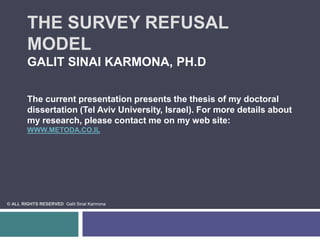Mais conteúdo relacionado
Semelhante a The Refusers (20)
The Refusers
- 1. The Survey Refusal Model Galit Sinai Karmona, Ph.DThe current presentation presents the thesis of my doctoral dissertation (Tel Aviv University, Israel). For more details about my research, please contact me on my web site: www.metoda.co.il © All Rights Reserved Galit Sinai Karmona
- 10. Introduction The phenomenon of the refusal to respond to surveys, is currently one of the most serious problems in conducting surveys. The goal of the research presented here, was to provide a theoretical foundation for researchers’ methodological and statistical instruments with which to address this problem. In order to reduce the statistical bias in surveys caused by the refusal, it is necessary to obtain information on the relative portion of the refusers in the research sample and on their characteristics. Based on these data, the researcher can increase the statistical weight of the respondents who actually participated in the survey and who have similar characteristics to the refusers, and thus to correct the representationality of the sample which has been biased by the refusal. © All Rights Reserved Galit Sinai Karmona
- 11. However, while the percentage of the refusers is known, there is usually no data regarding the statistics of this group. Therefore, is necessary to address the survey error caused by the refusal through a theoretical model that describes the factors associated with the process through which individuals decide to refuse to respond to the survey and the reasons for their refusal. The phenomenon of survey refusal and its causal factors have been examined by many scholars and have been the subject of numerous scientific papers and research studies over the recent decades. The current research presents an additional theoretical model - the Survey Refusal Model. © All Rights Reserved Galit Sinai Karmona
- 12. The Survey Refusal Model The Survey Refusal Model refers to the phenomenon of refusal in surveys from a broad social context anchored in the characteristics of the individual respondent and the environment in which he lives and operates. This model describes the characteristics of the individual and the individual’s environment impacting upon the decision-making process referring to the survey request, based on sociological theories as explanation for those impacts. © All Rights Reserved Galit Sinai Karmona
- 13. Methodology The empirical section of the study is based on data analysis of the European Social Survey (2002), which constitutes a database of opinions, values, behaviors and their changes over time. The research formed a statistical hierarchical (multivariate) model from the ESS for the empirical examination of the Survey Refusal Model. The model based on a sample of 32,867 respondents representing the populations age 15 and up in 17 European countries. The examination of the characteristics of the refusers was based on the Continuum Model, which assumes that there is a continuum of resistance to the survey request and that it is possible to arrive at an approximate estimation of the characteristics of the absolute refusers through extrapolation from the characteristics of the temporary refusers. © All Rights Reserved Galit Sinai Karmona
- 14. Results The findings and the conclusions of the research are summarized in the Survey Refusal Model. This theoretical model describes the way in which the characteristics of the three levels of analysis (individual, immediate social environment and normative cultural system) impact upon the individual’s decision-making process on survey participation. The assumption is that these characteristics are what shape the individual’s interpretation of the request to participate in the survey, based on their interactions with the survey design features (the survey subject, the research agency and the survey method), and it is this interpretation that influences the decision to refuse or participate in the survey. © All Rights Reserved Galit Sinai Karmona
- 15. Conclusions The research conclusions that are based on the analysis of the Survey Refusal Model may serve as a theoretical and practical tool for social scientists to reduce survey error stemming from the refusal. When conducting a survey, the researcher has to take several practical steps to minimize the error caused by the refusal of the individual in the sample to participate in the survey: lessening the percentage of refusal by a personal tailored appeal to social groups who tend to refuse to respond in surveys; calculating statistical weighting schemas to adjust the size of the social groups in the sample who tend to refuse to respond on surveys to their size in the target population; recognizing the limitations of the research and the generalization of the research conclusions only to those social groups actually represented in the sample. © All Rights Reserved Galit Sinai Karmona
- 16. To sum up the phenomenon of survey refusal is one of the most serious current problems in surveys and is not likely to disappear in the near future. The current research is an attempt to provide an additional step in developing the knowledge to minimize refusal bias in surveys, based on the social context that includes the individual respondent and the individual’s immediate social and cultural environment. On the practical level, the research conclusions seek to become an additional applications tool to be added to the social scientist’s toolbox for a more efficacious way to address the problem of basing studies on partial samples, both in comparative international studies as well as in studies of Israeli society. © All Rights Reserved Galit Sinai Karmona
- 17. Thank you © All Rights Reserved Galit Sinai Karmona

